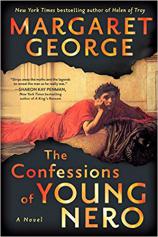Reading Group Guide
Discussion Questions
The Confessions of Young Nero

Augustus, a canny politician and great statesman, was unable to solve the basic dilemma of disguising the empire as a republic. It was part of Roman civic pride that they had banished kings --- Julius Caesar was assassinated for behaving like a king --- but in truth the Republic was not structured to govern what was now an empire.
So the fiction had to be maintained that the emperor was really just the first citizen. That meant the Romans could not openly have a dynasty and there was no clear line of succession --- hence every man for himself in securing the throne. In an atmosphere like that, there were no holds barred in battling for supremacy. So ruthless was this process that by the time of Nero’s death, there were no descendants of Augustus left alive, and the entire dynasty ended.
1. What if Nero had refused to compete for the crown? Could he have had a quiet life and pursued his art in peace? Later in life, he expressed the idea that he could support himself by his art if he were deposed. Was that at all realistic? Or just another of his romantic dreams?
2. Two living emperors (Caligula and Claudius) are in the book, and the earlier ones are a constant psychological presence. What effect does Nero’s awareness of his lineage and of the expectation that he live up to it have on him from an early age?
3. Nero’s descent from Augustus meant that he was always in a spotlight but at the same time obscure, as there were many other descendants of Augustus. In the book he says, “I was, as always, solitary and singled out.” He was both watched and ignored. What did he do in response to this?
4. There were rumors that Nero and his mother had an incestuous relationship, instigated by her as a means of controlling him. Of all the forms of incest, mother-son is the rarest. But it is the easiest to conceal, because mothers normally lavish affection on their children, including physical affection. In what ways do you see Agrippina’s seductive behavior affecting him in the novel?
5. How would you sum up Nero’s feelings toward his mother? Was the matricide at all justified? At what level? Political or psychological?
6. Did Nero really have no choice but to go along with Agrippina’s plans to murder Claudius so he could become emperor? What if he had refused?
7. Murder abounded in Nero’s family, but in the novel he wants to think he is different. At the same time, he fears he isn’t. Is there such a thing as “the blood of murderers” that is inherited?
8. There were four important women in Nero’s life: his mother; his first love, Acte; his first wife, Octavia; and his second wife, Poppaea. With the exception of Octavia, who was his arranged-marriage wife, the others were all older than he was and very strong characters. Acte and Poppaea he was madly in love with. Was he seeking a mother figure/surrogate in the older, beautiful, and strong-willed women he loved?
9. Nero was a romantic about marriage and exotic adventure. In what ways was this his undoing?
10. Nero was only 16 when he became emperor and held supreme power in many spheres. At an age when people now just become eligible to drive and are too young to serve in the military, he commanded the entire Roman army and empire. Considering this, how well did he perform?
It has been observed that Nero and Oscar Wilde had much in common. Both believed that life should be a work of art and that aesthetics was the most important aspect of living. Both, too, treated life and sexuality as theater. Because of this viewpoint, both came to a bad end, although the things they practiced are tolerated, if not condoned, today. Oscar Wilde’s quip as he passed through customs (“I have nothing to declare but my genius!”) and Nero’s last words (“What an artist dies in me!”) are very similar.
1. From his childhood on, Nero showed an interest in art and music. His earliest tutor, Paris, was an actor, and music was part of his education. How much influence do you think Paris had on him, teaching him at an influential age? Do you think art became a refuge for Nero, his private sanctuary when he needed to escape his role as emperor and his family’s machinations?
2. Two of Nero’s outstanding passions --- his love of Greece and his love of athletics --- must have come from somewhere, although both are un-Roman. The Romans thought Greece was effete and athletics for its own sake a waste of time. Why do you think Nero was drawn to both? Could it have been because of his early tutors, who were Greek? Was it his way of carving out his own identity?
3. As part of his Greek mania, Nero seemed obsessed by the story of Troy. He composed an epic about it, making Paris the hero. Paris was banished from Troy as a child because of a prophecy; as an adult, he was mocked for fighting with arrows from a distance rather than at close range with a sword like traditional epic heroes. Did Nero identify with Paris because Paris did not follow the pattern of epic heroes and was an outsider?
4. Nero was born right around the same time of year as the Saturnalia. It seemed to be his special holiday, where rules were suspended and people went about in disguise. He showed an early attraction to costumes, change of identity, and pageantry, and to rule breaking. What do you think inspired this behavior?
5. At times, Nero seemed to be several people, and he was aware of this when he said there was the daylight, dutiful Augustan Nero, the artist Nero, and the dark Nero who did dark deeds. He thought of them as separate entities rather than as facets of the same person. Was this his way of avoiding admitting the dark Nero was just as truly himself as the other ones?
6. One historian says the history of Nero’s reign was the attempt to “break boundaries.” In what ways did he do this in his personal and political life?
7. To be an emperor was to have supreme power over many things, but that in itself precluded anyone being truly honest with Nero. It also meant that there could be no true competition because no one could beat the emperor. What did this mean to his deep need to measure himself as an artist and an athlete?
The Confessions of Young Nero
- Publication Date: March 20, 2018
- Genres: Fiction, Historical Fiction
- Paperback: 544 pages
- Publisher: Berkley
- ISBN-10: 0451473396
- ISBN-13: 9780451473394








